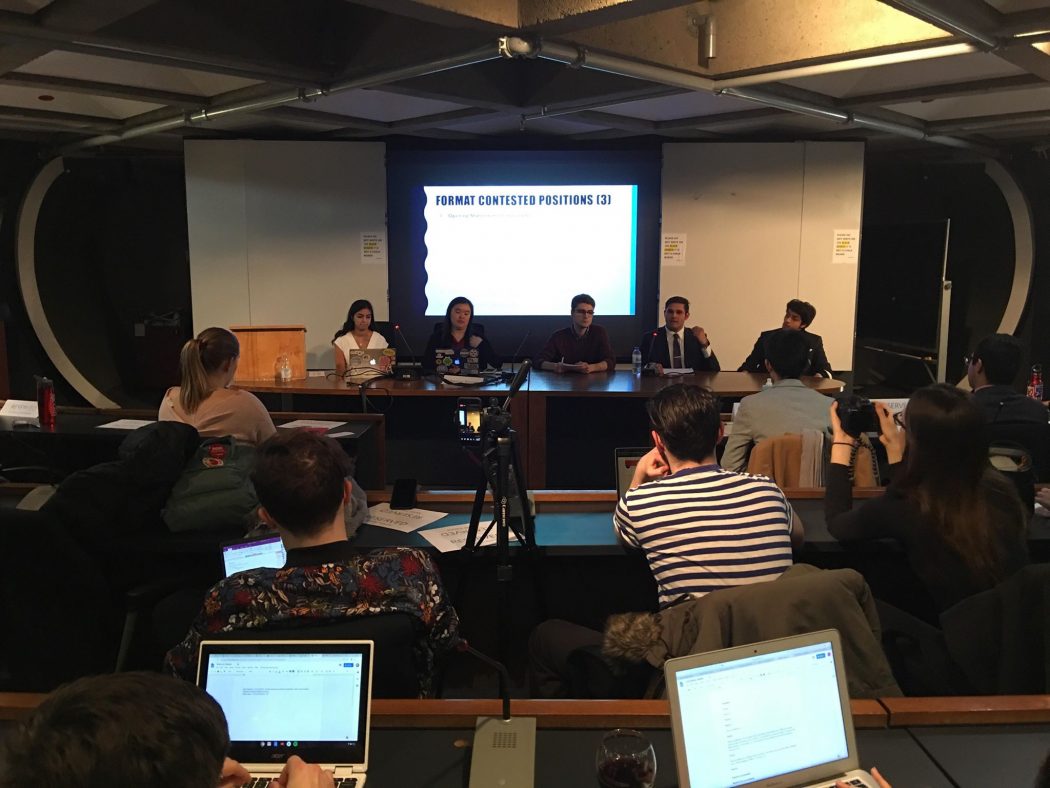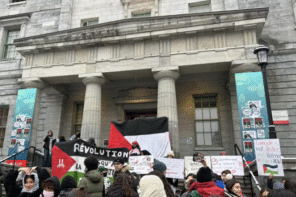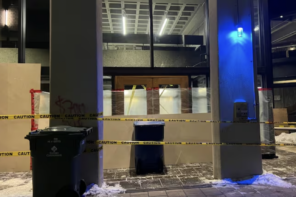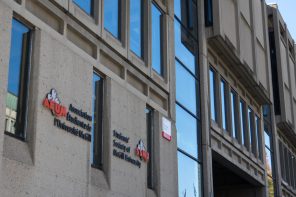On March 25, the day before polling began, Elections SSMU held the Candidates Debate. All candidates for each of the 6 positions presented their platforms, answered questions from past executives and constituents, and in some cases questioned one another. Below are the highlights of this debate.
VP Finance Candidates:
The VP Finance portion of the debate began with an opening statement by each candidate outlining their reasons for running. Sam Haward described his motivations for running, saying: “in my time working at SSMU, I’ve seen the level of work that people put into their clubs, their services, and their positions every day, but also the frustration that comes about when difficult processes make it impossible for people to access their resources.” Candidate Asher Yahya explained that he has “observed how SSMU can change its processes to become more efficient and improve the ease of doing business for these 230 clubs that they represent.” The final candidate, Ahmed Bawany, explained his motivations: “I am myself on scholarship, and because I know the importance of it, I feel for the students and don’t want any fraud or mismanagement of money. I will use that money for the welfare of students.”
During the question period, Yahya expanded on his platform and his desire to use the club surplus fund. He believes such an enormous surplus can be avoided in the future my having SSMU representatives to the clubs who most contribute to the surplus, naming SACoMSS, Midnight Kitchen, and TVM. Sam Haward reacted to Yahya’s plan, claiming “this money is accessible only by services, it cannot go to clubs, I want to make that absolutely clear… there needs to be a concrete step during the services budgeting process in March. My plan is to give services the ability to budget future expenditures into their current budget, which would mean higher investment services and higher utilization of this fund.”
Bawany later asked Yahya how he plans to get student’s permission to use this money, to which Yahya responded that he wants to pool the funds to be used between the services that contribute to the surplus. Bawany replied that “these funds need to be used on the students” and insisted that there should be a referendum to get student approval on directing the use of the funds.
When the candidates got to question one another, Haward called attention to the lack of planning around SSMU Banking in Bawany’s platform, to which he replied he plans to better communication with RBC, and provision of regular training. Haward also asked Yahya how he plans to deliver on his campaign promise of utilizing the surplus fund when it won’t be usable until 2020, and commented on his platform point of having SSMU representatives to these high surplus clubs, saying: “These services are part of SSMU, so I don’t understand what’s the point of a SSMU representative to SSMU… that just seems like bureaucracy that SSMU has been criticized on year after year.”
Yahya inquired as to how Bawany, as a first-year student, will be able to understand the funding and auditing processes, and other internal regulations of SSMU. Bawany replied: “None of you guys have done any job which is as big as being VP Finance and I talked to [Jun] and it’s a completely different job than being VP Finance of any club. It’s a very rigorous job and it requires a lot of focus and dedication, and since I’m in first year I have fresh new ideas.”
Bawany asked Haward about how he plans to stop fund mismanagement and fraud by clubs. Haward responded, saying “I think it’s really unfair to use the words ‘club’ and ‘fraud’ in the same sentence… clubs aren’t committing fraud. Clubs are unable to comply with complex regulations, that’s why they’re being sanctioned, not because they’re doing anything explicitly wrong.”
VP Internal Candidates:
Aandriana Jacob, who is running on a platform of advocacy and inclusivity and believes that large scale events like FacO and Frosh “provide an opportunity to promote the McGill spirit… and a great platform to promote inclusivity at school and awareness of larger issues.”
Sanchi Bhalla, the current Executive Finance Assistant at SSMU, said her platform can be summed up by “the first McGill chant we ever learned, ‘We are all best friends.’” She wants to involve students in more inclusive and inter-Faculty activities, and help build lasting connections and friendships. “Let me help you make McGill work for everyone,” she said.
When asked about increasing student participation in social media and ListerVs, Bhalla replied that she will capitalize on people’s passion for Faculty Olympics by having a weekly task in her ListerVs that people can complete to give points to their faculty. Comparatively, Jacob plans to make the ListerV a “one-stop shop” to make students aware of available resources.
To successfully carry out large-scale event planning, Bhalla emphasized the importance of a contingency plan for both events, and any associated contracts. Jacob referenced her background in event planning, notably as VP Events for her Residence Council.
Referencing Jacob’s platform, Bhalla asks how she plans to make ListerVs more accessible given that they’re already sent to every student. Jacob replied that she was not referencing outreach, but students with certain disorders that may limit accessibility. She said: “for example, people with dyslexia may find it harder to read the ListerV and one of the very easy ways to change that is to make the background a slightly tinted yellow instead of a plain white.”
Jacob asked Bhalla how she plans on giving students a voice on a provincial level. Bhalla replied: “I want an official SSMU group at major political parades like the Pride Parade, March for our Lives, the Environment March. We have had a presence at them but it hasn’t been as strong or concentrated as it could have been.”
Both candidates outlined their desire to create more dry-events for students who are less interested in drinking oriented events. When asked about their stances on the SSMU Base Fee Increase in the Master Plan, both candidates were in favour and neither believed it would greatly affect their portfolio.
VP External Candidate:
Adam Gwiazda-Amsel is running unopposed for the position of VP External. His platform focuses on cultivating strong relations between McGill and the provincial government, and improving the university’s community outreach, among other things.
Gwiazda-Amsel was asked about how the role of VP External has been criticized for not being politically neutral and whether it was possible to achieve neutrality while running SSMU campaigns in favour of certain causes. He answered that he “doesn’t think neutrality is the goal, or necessarily desirable of SSMU,” but that he “wants to represent student interests.” He promised that, if elected, he “would take the interest of all students.” “I’m not here to create factions or to only take the voices of some students and not others,” he said.
Gwiazda-Amsel also elaborated on plans to improve relations between students and the Milton-Parc community by increasing community involvement opportunities to further community integration. On increasing advocacy efforts for the francophone community of McGill, Gwiazda-Amsel, who is a Montreal native, said he would form a strong relationship with the Francophone Affairs community, as well as seek a “good external relationship with the rest of Montreal,” to create “on-and-off campus franco-accessibility.”
Gwiazda-Amsel was asked by an audience member how he would “uphold the values of equity, inclusivity, and diversity” in the role of VP External. In his response, he emphasized past experiences with diversity training and his plans to take more in the future. Gwiazda-Amsel seeks to build on the “concrete and solid ideas that people have been working on for the past 3-4 years on equity practices.” He also acknowledged the importance of “being aware of my biases and privileges and being aware of how those influence my decisions.”
When asked how he would decide which issues to remain neutral on, he answered, “when there are divisive and faction-y [sic] issues on campus, it’s more about questioning the premises of those debates and asking if we need to pick a side. There’s so much to do [as VP External] that trying to politicize the office, or even doing in accidentally… is not desirable. So it’s something that I’d consciously be moving away from. Like I said, there’s enough stuff to fill the portfolio without alienating students.”
Presidential Candidates:
The presidential candidates for this year are Kyle Rubenok and Bryan Buraga.
In his opening statement, Buraga emphasized that he is the candidate with more extensive experience with SSMU. His platform is based on “a year’s worth of consultations with students” from his role as Arts & Science Senator. Meanwhile, Rubenok highlighted his experience in other clubs and services, as well as outside of McGill. Rubenok’s goal as President would be to: “Restore faith in our responsible government for all students.”
Candidates were asked how they would manage their relationship with the SSMU and with the McGill administration, particularly in the context of the SSMU building re-opening. With regards to the administration, Rubenok replied, “my priority is to make sure that the relationship is good.” He acknowledged the logistical challenge of the building reopening and proposed “a partnership with Student Life and Learning to develop pages on the website to explain how clubs will be moved,” as well as “getting buy-in from stakeholders to support us through that move.”
Buraga acknowledged that in his role as Senator, he has had the “opportunity to create good working relationships with many members of McGill’s administration.” He plans “to use these relationships to maintain communications with [the administration] and ensure transition goes as smoothly as possible.”
Candidates were also asked about a major need they believe students are faced with and how they plan to approach it. Buraga’s answer was “the lack of communication with the student body” and he went on to say: “My hope is to create a new office – Communications SSMU – to create a sense that SSMU is really working for students. Quite often, good work is overshadowed by mistakes and failures. As President, this is something I would work to fix to rebuild that trust.”
Rubenok agreed that “student apathy and the lack of communication of SSMU’s smaller victories,” are major issues, but for him, the immediate glaring problem is the “looming closure of the Schulich library,” which he says will severely reduce study spaces for students. Rubenok plans to address this by finding alternative spaces such as the second-floor cafeteria of SSMU when it is reopened and accessing the Library Improvement Fund to make sure converted study-spaces are secured and accessible.
Lastly, candidates were asked about their perception of SSMU’s relationship with the administration and what their approach will be when representing student interests. Rubenok stated his plan is to maintain already-good relationships and “show the administration that we will be taken seriously and won’t let issues die down.” Buraga stated that “executives in the past have been afraid to show force. Of course, I prioritize working collaboratively, but in the case that the administration has not bowed to student interests, I propose we take a more hardline approach and use tactics that put student solutions in action.”
During audience questions, Buraga was asked about his history as a vocal critic of the current Executive Committee, including a December petition against the President and VP Finance. Buraga was asked what he has learned from the incumbent executive team. He responded, “there have been moments of agreement and disagreement. At the end of the day, we’ve put differences aside. The petition shows that I’m willing to use whatever means necessary to get things done for students.”
VP University Affairs Candidates:
The candidates for VP University Affairs are current Arts Senator, Madeline Wilson, and current Speaker of SSMU, Husayn Jamal.
During her self-introduction, Wilson spoke candidly about her experience with McGill, saying: “If there’s one thing I’ve learned through my involvement in academic advocacy its that historically McGill university rarely believes it has any incentive to be accountable to students’ needs. I believe this is changing. Students care about issues that impact them and I think that McGill is realizing it’s going to need to do more than put up red tape to keep us out.”
During the debate, both candidates highlighted their respective experiences working within SSMU and with other student groups. The current executives asked the candidates how they would ascertain what the student voice is, and how this might change depending on the issue. Wilson responded by explaining her plan to increase the number of students on committees so that one voice is not used to tokenize 20,000 people. Jamal responded, “One of the under-utilized tools… is the legislative council. Allowing students to bring forward ideas themselves would be really important.” When asked if their methodology would change depending on the issue, both candidates emphasized using their platform to give a voice to the individuals who are most affected by the issue.
While both platforms address the administration’s over-reliance on the creation of task forces and other committees to assess student needs, Wilson asked Jamal “how is [your proposed solution of] inviting student feedback in special sessions any different from what these external bodies are already doing?” Jamal responded that “the difference for me… is just that when the other members of Senate that aren’t students are able to hear directly from them, I think that’s a lot more impactful than filtering their voices through layers of committees and reports.” Jamal also referenced the Dalhousie University Senate’s recent reform of increasing students’ direct participation, and his desire to push McGill to adopt the same model.
Jamal questioned Wilson on her opposition to the base-fee increase, stating that her plan to have SSMU become a part of work-study programs is not sufficient cost-wise. Wilson clarified that she does not plan for work-study to be the only option, but that it is one example of a sustainable solution. She explained, “The base fee increase was done without adequate consultation due to the fact that it’s unfair to expect students who have been privy to resources their entire time at McGill to now have to pay $30 more to access the exact same resources… The work study example is just one way to make the base fee increase more accessible because for some students, $30 is a financial burden… Obviously, I know SSMU needs these resources but I think there has to have been a better plan to do that.”
When asked by an audience member about her desire to create “shadow task forces” which would mirror university-created task forces at the SSMU level as an act of protest, Wilson replied: “I think that this is an animated approach toward the current situation because I don’t think that just pushing the university to stop creating these task forces is going to work. I think that the university only responds when it’s being threatened, unfortunately, and I think that this is an appropriate and spunky way to do it.” When further prompted by Jamal about how she’ll ensure that “student labour will not go to waste,” Wilson commented: “We first prevent labour from being incurred by reaching student parity in the first place so we don’t have to start this process, but if we do, making sure that it’s at the forefront of our communications.”
VP Student Life Candidate:
Billy Kawasaki is running unopposed for the position. Kawasaki decided to run “after seeing a need for informed leadership,” describing himself as “the bridge between what SSMU has and what SSMU needs to do.” If elected, he seeks to “secure institutional memory and knowledge and create frameworks and processes that last for years.”
Kawasaki was asked by the current executives about his plans to manage a smooth transition back to the SSMU building when it reopens. Kawasaki emphasized the importance of ensuring all groups are kept well-informed and that all groups have the resources to complete the move. Kawasaki also stated he would continue former VP Student Life Cody Esterle’s practice of booking spaces within the McGill community but outside the SSMU building on “a case-by-case basis,” explaining, “if we can create a system that’s easy for student groups to follow, then I think it’s alright to continue doing that, especially if there’s a demand.” Finally, Kawasaki was asked how he would work efficiently with all clubs and services while maintaining his own mental health. He stated that his plans to “build institutions like a portal and provide on-demand training” will help to “lessen the workload and streamline it,” thereby making it more manageable.
Kawasaki was asked by an audience member, about his role in the AUS executives’ failure to uphold the constitution in the course of the POLI 339 controversy: “How can voters believe that this time, things will be different?” Kawasaki replied that he had addressed the situation by “acknowledg[ing], apologiz[ing] and aton[ing].” He elaborated: “I’ve atoned by resigning. I think going forward, it’s important to be as transparent as possible. Rubenok also asked about how Kawasaki planned to efficiently allocate his time amongst the hundreds of organizations within SSMU to ensure he was accessible to all those who demanded his time. Kawasaki answered, “The important thing is to utilize all the resources we have and streamline information.”
In closing, Kawasaki stated, “I’m looking forward to making sure clubs can do what they need to do while minimizing their administrative time, making sure everything is streamlined, supporting existing services, and making sure the foundation is laid out so future generations do not have as much to figure out as we do.”








